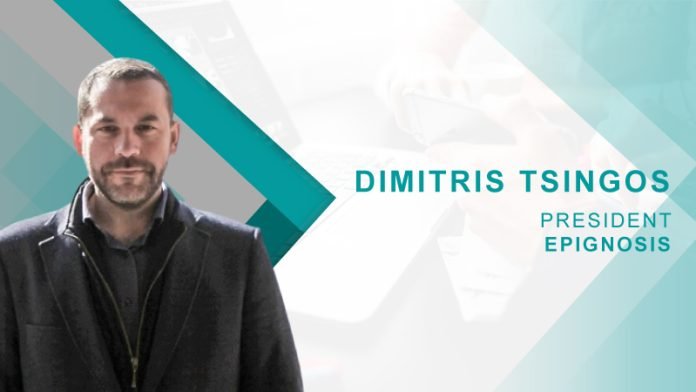Dimitris, kindly brief us about yourself and your journey as the Co-Founder and President of Epignosis.
I have always been passionate about entrepreneurship ever since I can remember. I jump-started this journey as an undergrad student in 2000 with the launch of Virtual Trip, the first student-founded and generally one of the first tech startups in my home country, Greece. Later in 2012, I co-founded Starttech Ventures, a private investor and venture builder in Athens focused on SaaS companies for the international market. In this capacity, I have been the co-founder and founding investor of more than a dozen tech companies, with Epignosis being the flagship one.
What inspired you to co-found an organization that caters to the learning needs of modern organizations, and what was your vision for the company?
Me and my now business partner, Thanos Papangelis’ – co-founder and CEO of Epignosis’s – initial idea was to create an online school supporting Greek graduating high school seniors in their University entrance exams, which we called eFront. But after many obstacles, failures, and pivots, we decided to change direction and restructure the company to have an international focus, building however on the same principles: An extremely easy-to-use product that would turn to learn into a joyful, refreshing experience. While eFront was finding early success in the international market, we recognized the SaaS wave coming into the software world and the immense opportunities that it was bringing. We, then, pivoted to a different target audience, small and medium-sized companies in the global market that wanted to train their employees. We were driven by our vision of creating a SaaS company that democratizes learning by making premium eLearning technology accessible and affordable to any company or organization. Since this decision in 2012, Epignosis’s premium yet affordable platforms – eFront, TalentLMS, and TalentCards – have been chosen by hundreds of thousands of companies around the world who want to help their people grow and excel.
How does your company’s HR technology-centric approach help organizations meet their learning and development goals more effectively?
TalentLMS, our flagship product, consistently ranks as a leader in terms of ease of use and setup (in the latest independent G2 report, TalentLMS scored 91% for ease of setup, vs the category average of 83%). The platform lets you build training courses in minutes, manage users in a few clicks, and start training right away. TalentLMS also scales on demand according to users’ needs and it’s one of the only corporate LMSs that offers a freemium account, giving course creators the power to make an informed and unrushed decision on whether TalentLMS is the right choice for them. We also offer organizations the opportunity to start their training right away with TalentLibrary, an in-built collection of courses for instant soft-skills training. Animated and interactive with a cast of unique characters who take on a variety of roles. Every topic is heavily researched and each course is made up of mini-lessons between 2-3 minutes each in order to maximize learner engagement. Our portfolio also includes TalentCards, a mobile learning platform, designed for deskless workforce training. Employees can sign in from their mobile devices and complete their training any time, any place, using a native iOS and Android app.
Also, to address the HR needs of companies that do not have a solution yet, we have just launched our latest product, TalentHR. The platform is a modern HRIS that offers integration with our LMS and replaces spreadsheets and helps businesses manage their employees in a simple yet consistent way.
How does your company ensure that its learning solutions are scalable and adaptable to the evolving needs of organizations in different industries?
All of our cloud platforms scale on demand according to users’ needs and come with zero maintenance, no hidden fees, long-term commitments, or lock-ins. Also, the freemium account gives course creators the power to make an informed and unrushed decision on whether a platform is the right choice for them. Whether an organization is just getting started or enterprise-level, they can start for free and when they’re ready to take the next step, our platforms are ready to scale with them.
How do you stay up-to-date with the latest trends and developments in HR technology and learning management, and incorporate them into your product roadmap?
Staying up-to-date with the latest trends in learning and HR technology is a top priority for us.
The driving force of our product development is none other than our own customers. Gathering feedback regularly helps us understand their evolving needs and challenges and identify areas for improvement and new features that are then incorporated into our products. Also, we engage with industry leaders and actively seek new partnerships and collaborations with other companies in the HR tech space. By working together, we are able to offer our customers more integrations and develop new and innovative solutions. Finally, we encourage continuous education and development of our teams to maintain a high level of expertise and identify new opportunities.
Can you share any success stories or case studies of organizations implementing your solutions and seeing significant improvements in their learning and development outcomes?
Roland, a global electronic musical instruments and software company, faced sales operation difficulties when the pandemic hit. With sales and marketing offices worldwide and with limited time and budget for in-person training, they moved their training online using TalentLMS within just one week. One of their biggest challenges was expanding training to their distribution partners and staff in music shops globally, which they achieved thanks to TalentLMS. As Corin Birchall, VP of Global Retail Operations at Roland, says, “TalentLMS has elevated training, from being something we do to being a key part of everything we do.” says. Birchall also notes that “the net effect is we are going to massively upskill our workforce across the company. TalentLMS has unlocked this potential that didn’t really exist before.”
Rosetta Stone’s customer service department needed a way to effectively train new employees while still measuring success. In the client’s own words, they found TalentLMS to be a cost-effective solution that allowed them to organize training using customized courses and measure effectiveness through testing. They also found that it was simple to utilize within their company and they were able to commence training quickly, which suited their requirements perfectly.” Rosetta Stone mentions that with TalentLMS the customer service department was able to organize all training resources and create customized courses quickly. They were also able to measure knowledge absorption for content improvement and have a full understanding of how the training is working and which areas need modifying for ultimate effectiveness. In general, Rosetta Stones notes that this has improved our internal online training dramatically and streamlined the process in the meantime.
Based on TalentLMS’ recent survey, how can companies provide financial wellness support to their employees?
Employees’ financial well-being is largely dependent on their employers, who are in the perfect position to help. According to our recent survey, 78% of employees desire support from their employers due to inflation.
Employees want their companies to offer financial benefits that help them relieve the stress they are feeling. Overall, retirement planning, investment programs, and emergency savings are the most sought-after benefits for employees. But it’s not a one-size-fits-all, and companies need to maintain flexibility in benefits packages. For instance, our survey showed that meal allowance fell within the top three wellness benefits Gen Zers are seeking, financial coaching for Millennials, and medical care cost planning for Baby Boomers.
Companies can also provide financial wellness training on topics like retirement planning, saving and budgeting, money management, financial literacy, and 1:1 financial coaching/advising, just to name a few. We discovered financial wellness training at work is important to 65% of employees; however, nearly half of the employees are not getting it from their companies.
What are some of the benefits of providing financial wellness benefits to employees in today’s economic climate?
By offering employees financial benefits to combat employee uncertainty and stress, employers increase workplace happiness. Happy people are less likely to quit their jobs. In fact, our research showed 68% of employees are more likely to stay longer at their job if their employer offers financial wellness benefits, and 8 out of 10 employees receiving financial wellness benefits from their company are satisfied with their job. Also, offering financial wellness training as a benefit to employees will not only make employees more satisfied in their everyday work-life, but also help companies build a more confident and focused workforce. Sixty-seven percent who received financial wellness training say it helped their productivity, 66% said it helped them be more focused at work, and 71% noticed the training was reducing their stress levels.
What advice would you give budding entrepreneurs and leaders aspiring to venture into this industry?
The best piece of advice I can give to any entrepreneur is to beware of the ‘nice-to-have’ trap. Most of the new products launched are good enough, oftentimes they are very cool and smart. Unfortunately, however, the vast majority of them fail to provide such a high value that will make prospective customers actually pay for them. This happens regardless of the enthusiastic reviews a new product might get. The fact that it is ‘nice’, doesn’t necessarily mean that it is worth paying for. Founders, then, should focus on creating must-have products, which customers, in a way, cannot live without.
Specifically now for our industry, one should always keep in mind that the world’s economy is becoming more and more knowledge-based and that this trend will only accelerate in the future. Being a computer scientist by education and a lean startup aficionado by profession, I have learned that by far the most difficult problem is to actually define the problem itself. The incredible developments with generative AI and machine learning, in general, make clear to everyone that ‘asking the right questions’ is the most important skill to develop in our era; it actually has always been so, it just now became evident to everyone. Founders, then, should excel in this activity: They must ask the right questions to their target customers so that they really understand their needs and in turn, they create the appropriate value propositions.
Finally, what are your future plans for your company, and how do you see it evolving in the years to come to stay ahead of the competition?
Much as 2023 marks the milestone of twenty years of my partnership with Thanos and our joint work in learning technologies, as well as the 11th year of Epignosis in the international market, I am convinced that we are still in the beginning of our journey and that our company’s brightest days are ahead of us. As mentioned above, the economy of the world is becoming increasingly knowledge-based; we anticipate a significant increase in the demand for learning technologies like the ones we develop in Epignosis coming from any industry, any geography, and organizations of any size. We shall keep focusing on how we can make these technologies even easier to use, even more affordable, and even more accessible to all, leveraging all technological development and always staying human-centered. The democratization of learning has just started and we are determined to keep doing our best to make it a reality for every business, regardless of industry, size, and geography.
Discover the full potential of your Hrtech strategy with our comprehensive Hrtech News and Hrtech Interviews.
Want to Contribute? CLICK HERE To Submit Your Guest Post and Join Our Community of Writers!!!

Dimitris Tsingos President at Epignosis
Dimitris Tsingos is a Greek tech entrepreneur and investor, known for co-founding Epignosis, a global player in the learning technologies market. He is also the founder and CEO of Starttech Ventures, a private investor and venture builder that gave birth to Epignosis and several other tech companies. Tsingos has co-founded or invested in more than a dozen tech companies, including AbZorba Games and Yodeck. He is proud of the democratic company culture and positive change approach that characterizes every startup growing in the Starttech Ventures ecosystem. He has also served in several non-profits and holds a BSc in Computer Science and an MBA International.












